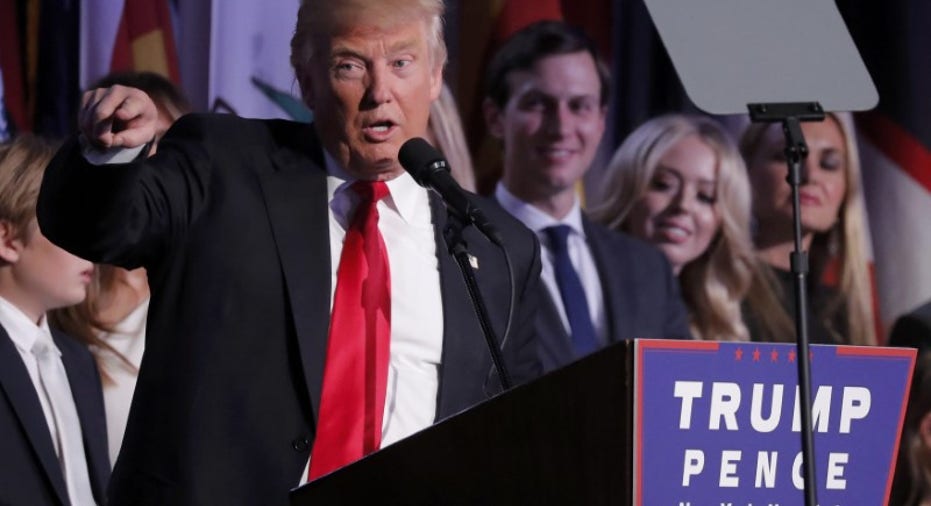Trump's Economic Revolution: Where to Find Job Growth in 2017

A big part of Donald Trump’s promise to “Make America Great Again” is bringing back higher paying jobs to the U.S. While November’s unemployment rate reached the lowest level since August 2007, many of the new openings were low quality, low paying positions. Wage growth in the wake of the financial crisis has been nominal at best.
Trump’s policy of encouraging the repatriation of foreign profits is a great first step toward improving the quality of jobs, David Bahnsen, founder and chief investment officer at The Bahnsen Group of HighTower Advisors, told FOXBusiness.com.
“We think that if the money can come back onshore in a way that increases capital expenditures, if businesses see a kind of renaissance of cap-ex spending, that will absolutely lead to…[a] higher quantity of jobs created, but much more importantly, is the quality of jobs created,” he said.
It’s not just job seekers hopeful for changes to come under the Trump administration. Wall Street has been cheering Trump’s pro-business policies with the Dow Jones Industrial Average approaching 20,000 for the first time, as it rides hopes for increased economic growth over the next four years.
In just one month, President-elect Donald Trump will be able to put his economic policies into action. Here are the sectors poised for the biggest boom in job creation through 2020.
Energy
“I think we’re headed to a real deregulatory environment in the energy sector that will lead to a lot of job creation,” Bahnsen said.
Trump’s policies in the energy sector center around American energy independence. He has pledged to create “millions of new jobs” through undoing the Obama administration’s regulations on coal, shale and oil, while also encouraging the use of natural gas.
Deregulation in the energy sector is also likely to lead to a cash infusion from investors.
“Business investment should improve drastically which will create a wave of high paying jobs,” Chad Morganlander, portfolio manager at Washington Cross Advisors, told FOXBusiness.com.
Many see Trump’s nomination of ExxonMobil (NYSE:XOM) CEO Rex Tillerson to the critically important role of Secretary of State as another good sign for the industry. Trump has also nominated former Governor Rick Perry (R-TX) to the position of Energy Secretary. Texas is a state rich in fossil fuels, and Perry has been a fervent supporter of sanctioning their extraction.
Industrials
The industrial, or manufacturing, sector could also see a rise in the number of high quality jobs under the Trump administration.
The President-elect has already demonstrated his commitment to preventing manufacturing jobs from retreating overseas. He has personally confronted Ford (NYSE:F), United Technologies (NYSE:UTX) and Rexnord (NYSE:RXN) about outsourcing production, even striking a deal with Carrier to save jobs at its Indiana plant.
Additionally, Trump has proposed a $1 trillion infrastructure plan that would not only provide stimulus to the economy; it would also create an abundance of construction jobs.
Meanwhile, the continuation of the Federal Reserve’s monetary policy and ultra-low rates are likely to lend an added benefit, Morganlander said.
Healthcare
The Trump administration has been consistent and adamant about its commitment to repealing and replacing the Affordable Care Act, one of President Obama’s most highly touted policy achievements. Deregulation in the healthcare industry could lead to better opportunities for job seekers in this field.
“If [Trump] is successful at all in deregulating healthcare, those tend to be very good paying jobs. So I think it would bring wages up,” Bahnsen said.
With an aging population, the trends in healthcare point upward regardless of Trump’s Obamacare promises, Morganlander said.
“Additional financial capital and human capital will be needed to support the graying of America.”
Biggest Losers
While there are plenty of reasons for sanguinity among American workers, it might not be across the board growth for every industry. A couple of areas that could suffer job losses as a result of Trump’s economic policies are multinational corporations, the shipping industry and consumer discretionary, Bahnsen said.
“In theory…If indeed some of [Trump’s] anti-trade and some of the more protectionist rhetoric comes through, that [could impact] some of the more globally oriented companies. If we see a reduction in exports, because trade levels decline, then that could hurt some of the consumer staples that may need less people at some of the ports, and shipping industries may decline,” he explained.



















